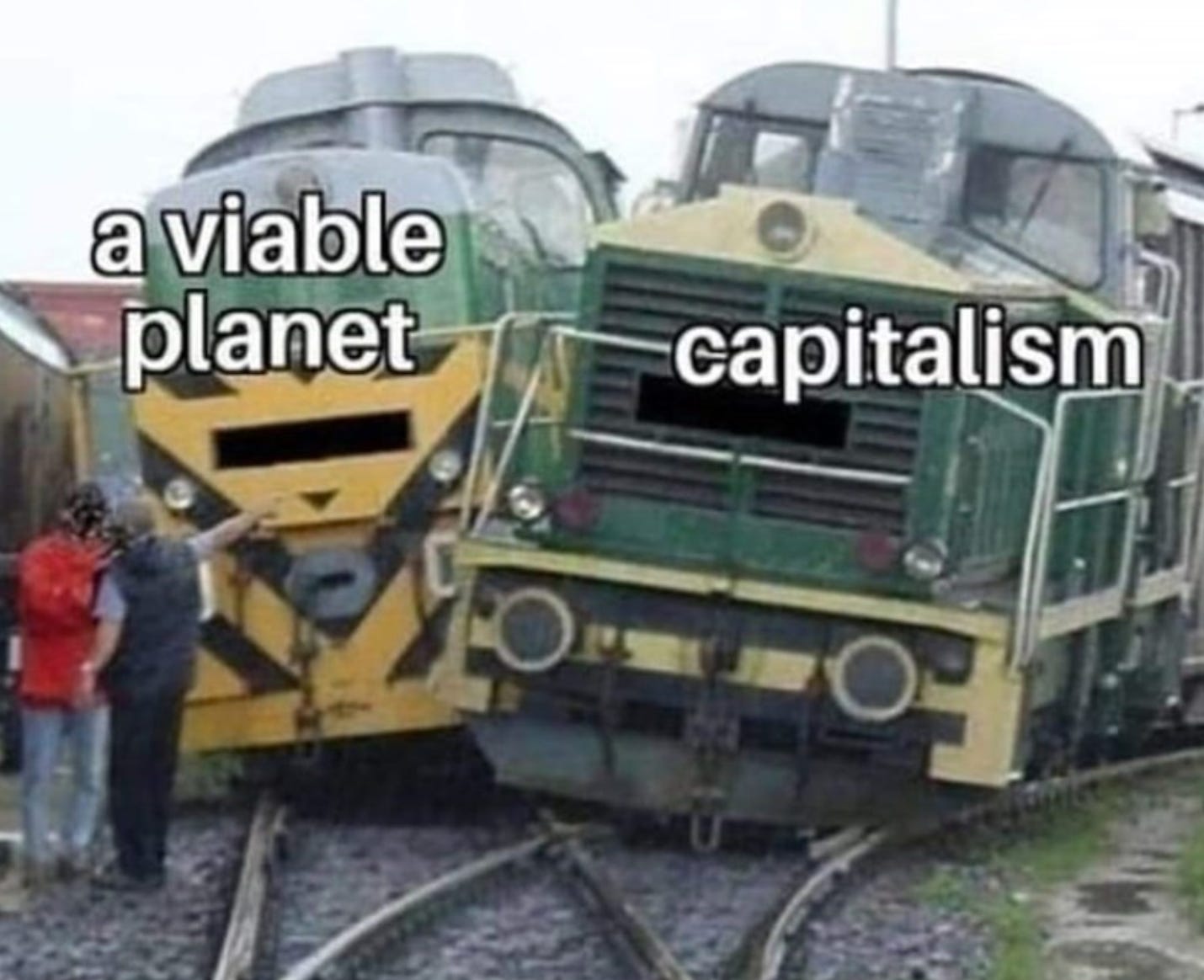Dear Climate Therapist: I feel surrounded by false climate solutions and denial
Our climate therapist Kyle Hill responds to a reader feeling trapped between two different types of climate denial
Hi, friend. If you’re reading this week’s newsletter and wondering how you can transform your outrage, your grief, or your concern into small but tangible action that helps the world keep talking about the very real mental health impacts of the climate crisis, may we humbly offer one possibility: become a paid subscriber or if you prefer, support Gen Dread with a one-time donation through our partner, Small Change Fund. We want to keep the conversation going as much as you do, and we’d be so grateful for your help.
As you may know, we’ve recently launched a feature on Gen Dread called The Climate Therapist, where you can write to us with any question you have about how the climate crisis is affecting you mentally, emotionally, or spiritually. Our incredible and empathetic team of three climate-aware therapists – Kyle Hill, Leslie Davenport, and Caroline Hickman – will choose a question and one of them will respond in detail. This week, Kyle is taking the reins.
Ready to submit your question?
This week’s question comes to us from Caught Between Two Fronts of Denial. It is responded to by Kyle Hill, an Ojibwe, Dakota, Lakota climate-aware therapist and professor of public health whose research considers the social, political, and ecological determinants of Indigenous health, as well as the intersection of climate justice and Land-based healing within Indigenous communities.
They write:
Dear Climate Therapist,
I have been a climate campaigner and researcher since 2000, participated in COP in 2001, studied watersheds, and practice regenerative agriculture at home. I have learned about vegetation cooling and the small water cycle, deforestation for biofuels and for burning wood pellets as “carbon neutral” energy, while governments clear indigenous people off the most biodiverse lands so they can claim carbon offset payments. I conclude that flawed climate action is now the #1 driver of biodiversity extinction.
I am now concerned how climate activists “deny” the massive scale of ecosystem destruction from flawed climate policies. The Far Right may pick up such critique, so many climate activists hush (or even deny) my valid concerns. I feel caught between two fronts: Right denial of climate change, and progressive denial of flawed climate policies. I feel estranged from my peers now, and alone. How can we come together again, without denial or hypocrisy from semi-progressive activists who dilute themselves with "sustainable consumerism"? How can we avoid feeding the Right deniers?
- Caught Between Two Fronts of Denial
Over to you, Kyle.
Dear Caught Between Two Fronts of Denial,
Recognizing the duality of life and holding a dialectic are important considerations for our own wellbeing, whether the source of discomfort is interpersonal or intrapersonal. In this case, we are challenged with reconciling the opinions of two opposing forces: those of progressive and conservative perspectives, or outright denial, of the climate crises. To compound these feelings of disappointment and frustration, we are left with the emotional residue of loneliness in the midst of an exceedingly complicated problem to our global community. In and of itself, loneliness can be paralyzing when we need everyone to be engaged on this issue, while also holding the needs of our communities at front of mind.
The reality, at least in my experience, is that climate change amplifies any emotion, particularly those that might be distinct from our fellow community members whom we are led to believe share our sentiments and perspectives, but all too often, may not. Altogether, this moment is so much bigger than us, and when we take that view, it is natural to feel helpless, hopeless, apathetic, or at the very least, feel overwhelmed by the gravity of the problem. However, when we take note of the growth of new life, the moisture of the soil on our fingers, and wind on our skin, we can take a breath and seek solace in the moment. Then, maybe, a sense of peace, love and catharsis may overtake those more energy inefficient emotions (hopelessness, despair, frustration, helplessness, disappointment, etc.).
Finally, as an Indigenous observer, hoper and dreamer, I recognize the destructive fallacy of capitalism in the context of the climate crises, a key contributor to the anthropocene. Further displacement of Indigenous Peoples only serves to reinforce the architecture of settler-colonialism, supplanting our ability to reclaim the essential kinship to our local ecosystems, as our ancestors have done. As a consequence, we must recognize that our interconnectedness with the natural world, or Mother Earth, is an important determinant of planetary health and arbiter of climate resilience that we are all entitled to, and that we have a responsibility to employ at varying scales.
All this is to say, you’re not wrong, and I see you. Though, I wonder how we can assert our own understanding of adaptation and/or mitigation of climate change (including false climate solutions) from a perspective that does not extract or detract from our presence in the moment, nor one that takes from our spiritual and emotional wellbeing? How do we reconcile the imperfect nature of humanity, the embeddedness of capitalist economies, in our own views of climate justice? In closing, I share your sentiments, and hope that in our allyship and community we can source our healing from the love, reciprocity and kinship with the land, in solidarity with one another.
In solidarity,
Kyle
If you liked reading this, feel free to click the ❤️ button on this post so more people can discover it on Substack 🙏🏼
Making Waves
Do you wish someone would suddenly appear in a poof of green smoke and hand you a personalized guide to the climate actions you specifically should take to have the biggest impact on the climate crisis? Let us introduce you to that exact thing. Professor Kimberly Nicholas is a climate scientist, teacher, and writer, and she has generously created the Choose Your Own Adventure: Climate Action Quiz to help you bust through those feelings of paralysis and overwhelm and start pushing toward real systemic change. Answer her list of questions and she’ll tell you the five climate superpowers unique to you and how best to wield them. Here is the quiz.
‘Till next time!




Dear Caught Between Two Fronts of Denial,
I believe that you deserve a political answer, too. And I think I hear/see the answer in the clear way you describe the question. Personally, I don't feel caught, because I think the deniers of climate chaos can be ignored. I don't worry about feeding them, nor about what they'll try to use as food. I do think that when people like you & me are clear on how wrong deforestation is, and on how wrong pushing indigenous people off their land is, (and most children are clear on such basics!), that we should unhesitatingly speak clearly & loudly to that point. Your peers need to hear your clear voice! You have credibility; you will make them think. Your confidence (expressed perhaps with a calm, clear style) will help them 'get it.' "Duh" issues should be painted that way: "duh drinking bleach won't solve a disease problem. Duh cutting down forest makes everything worse." And in the second aspect you ask about at the end, you also have the answer embedded in your description: the way to model countering bad consumerism is precisely to come together to share a pot of cooked food, rather than buying individual packages of it. Talk directly about all the energy/waste aspects of this simple, tangible issue in front of people at events all the time. Say/advertise "we'll bring the food; you bring your own bowl & spoon." Let people feel good in that one moment & have the experiential learning that that wasn't so hard, wasn't so weird, & truly points the way to what is possible & what we're capable of. (Older folks will actually remember doing this just a few decades ago!). Hugs & confidence!
https://www.academia.edu/118649459/Apocalyptic_Anxiety_and_Fragilification_of_Time